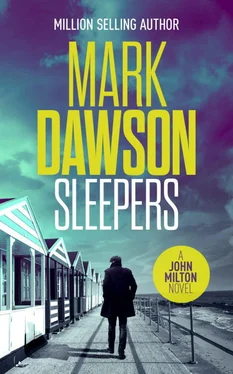Mark Dawson
SLEEPERS
A JOHN MILTON THRILLER
Leonard Geggel spent the drive to Southwold thinking about CHERRY. It had been a year since Geggel’s retirement from MI6 and he hadn’t spoken to his old agent since then. Indeed, they had not parted on the best of terms. Pyotr Ilyich Aleksandrov had always been a cantankerous man, but, as the Russian grew older and more resigned to the fact that he would never be able to return home, he had become more and more frustrated. The two of them had argued during their last meeting. Aleksandrov had said that he needed an increase in his stipend so that he could move to a different house. Upon investigation, Geggel had found that Aleksandrov and his neighbour had fallen out over the folk music that Aleksandrov liked to play late at night as he drank himself into a stupor on the Moskovskaya Osobaya vodka that he had imported from Poland. Geggel had not even taken Aleksandrov’s request up the chain; he knew that it would be rejected and agreed that rejection would have been the right response. He had told Aleksandrov that there was to be no more money, and that he should make it up with his neighbour. The suggestion had provoked a foul-mouthed tirade against him, MI6 and the British state, followed by the angry suggestion that his work was not valued and that he should never have defected in the first place.
That had been the last time that they had met. It had come as a surprise, then, that Aleksandrov had made contact. He had called Geggel on his personal number and insisted that he must come to Southwold at once. Geggel had asked the reason for the urgency, but Aleksandrov would not be drawn on it. Instead, he had reiterated that it was of critical importance and that it simply could not wait. Geggel had reminded Aleksandrov that he was retired, and that it would be more appropriate to contact the woman who had replaced him as his handler. Aleksandrov had dismissed the suggestion, saying that Ross was young and incompetent. There was sexism there, too: Geggel knew that Aleksandrov did not hold truck with the idea that women could run male assets, and that he thought their value in intelligence-gathering was to ‘open their legs and listen carefully.’ Aleksandrov had added that he would only deal with someone that he knew and trusted. That, in the Russian’s world, was as close to a compliment as one would ever likely get, and, after considering the request for a moment, Geggel said that he would come.
In truth, Geggel had been looking for something interesting to take his mind off the mundanities of his forced retirement. He hadn’t wanted to leave the Service, but there had been an unfortunate incident where one of the agents he had been running in Tirana had been blown, and the shit had rolled downhill to him. Geggel still did not understand how the agent had been revealed to the SVR; he had always been scrupulously careful, and the agent—a secretary in the prime minister’s office—had been so cautious that it had been almost impossible to arrange face-to-face meetings. Geggel’s conclusion was that the source had been blown by way of a leak from inside MI6. He had suggested it to his line manager but, after a week of lip service about an investigation that Geggel knew had never got started, it was suggested that the error was down to him and that, perhaps, it was time for him to think about calling it a day.
He had dabbled with lecturing, but teaching others about geopolitical events just reminded him that he no longer had any role in shaping them. He had retreated to his garden, clearing out a messy bed and replacing it with a polytunnel where he could grow vegetables all year long. He had found some peace there, but when he lay awake at night, his le Carrés and Ludlums finally laid down on the bedside table next to him, he would close his eyes and imagine the life that he had once led. There was no point in pretending otherwise: he missed it.
Geggel had been on the A12 for almost all of the journey. It was a poor road, and, as soon as he was beyond Ipswich, it became a single carriageway prone to delays as cars queued behind the tractors that rumbled between the mirror-flat fields that made up the East Anglian landscape.
He looked down at the phone that he had dropped into the cupholder and wondered, again, whether he should call the River House and tell them about Aleksandrov’s contact. He had wrestled with that choice ever since they had spoken and, ultimately, had decided against it. He knew what would happen. The details of the call would be passed to his replacement and it would be she who went to speak to Aleksandrov. Geggel and the old agent disagreed on many things, but they did share some common ground. Chief among them was a disdain for the woman—Geggel remembered her name, Ross—and, more to the point, the things that she represented.
It wasn’t that she was a woman, at least not for Geggel. It was that she was part of the new influx of SIS staff, those who responded to the vulgar advertisements in the newspapers that promised a fulfilling life as a ‘spy.’ Geggel and his old colleagues had shared a laugh over one particular advert that they had seen in the Times . ‘If the qualities that made a good spy were obvious, they wouldn’t make a very good spy.’ The whole thing was preposterous. These bright young graduates, fresh out of university, were selected with psychometrics and then fast-tracked. It was to the detriment of the old sweats who had been there for years and knew how things really worked. The change in culture was the reason Geggel had not fought against his enforced retirement. Aleksandrov had chuckled at Geggel’s annoyance, but had then suggested that he had heard through the grapevine that Yasenevo was not so different, either. The old warhorses, like them, were being put out to pasture in the Center just as they were in Vauxhall Cross. This was a brave new world, moving too fast for them to keep up. Aleksandrov had poured two tumblers of Moskovskaya and they had toasted their obsolescence together.
He continued north, passing the turn for Walberswick, and then approached the road that led to Southwold.
Pyotr Aleksandrov glanced out of the front window and looked up at the sky. It was clear, suggesting that the forecast for sunny and warm weather was going to be accurate. He went through to the hallway, collected his jacket, and picked up the briefcase with the documents that he had printed out last night. Anastasiya had emailed him the sample schematics and he was confident that he would be able to parlay them into everything that they needed to bring her safely back to him.
He opened the briefcase and withdrew one of the pages, looking at the technical drawing and daydreaming for a moment. He had long since given up the possibility that he might be reconciled with his daughter. They had parted on such bad terms. He had been in the gulag for four years, and his ex-wife had spent that time dripping her poison into Anastasiya’s ear: he was a traitor, he was selfish, he was greedy, he cared only for himself. He had seen her once after his unexpected release and had offered to bring her with him to the west, but she had refused and, at the culmination of the argument that followed, had told him that she never wanted to see him again. Her recent email had come out of the blue, and had allowed him to dream of a reconciliation.
He just had to persuade Geggel to help him.
He slid the schematic back into the case and closed the clasps. He zipped up his jacket, opened the door, and stepped out onto the street. He was surprised to find that he was nervous. This was not the first time that he had met with Geggel to sell intelligence. They had done it for ten years, and it had made him several hundred thousand pounds and had secured this life, shabby and tedious though it might be. He was well acquainted with Geggel; his old runner was the nearest thing that he had to a friend. But times had changed. Aleksandrov was no longer operational and Geggel was retired. They had argued, too. He didn’t know how the meet would play out, and that made him feel unsettled. He reminded himself that he hadn’t arranged this rendezvous for his own benefit. He was doing it for Anastasiya. She was in hiding, somewhere between Lake Baikal and the Pacific, and Aleksandrov knew that the FSB’s bloodhounds were out looking for her.
Читать дальше












